Ithaca, described as “nice and quiet” by residents, is a predominantly African-Guyanese village located at the end of the West Bank of Berbice and is bounded by Blairmont settlement to the left.
This newspaper was lucky to meet Koreen Goodridge, a friendly and helpful woman. She was happy for her village to be featured “because some people don’t really know about Ithaca” and even accompanied this reporter around.
The intermittent rain had started again as we drove down one of the streets. These slight showers of blessings, however, did not prevent a family from fishing in the small trench at the side of the street. A woman and a boy sat on plastic chairs as they waited on fish to bite the worm bait on their hooks while two girls displayed their catch. Soon after the showers came down more heavily and the woman lifted the plastic chair over her head as we ran for cover. Another woman pushing a baby in a stroller hustled out of the rain as well.

Further up a group of men was consuming alcohol on that chilly morning at a bottom-house rum shop. They were not willing to have their photos taken, except for Jermaine Johnson, a construction worker and his friend.
At the head of the village is the Ithaca Primary which houses the nursery school in a section of the lower flat. The primary school pupils had been dismissed for the midday break. A young girl took a bicycle from a man and rode hurriedly down the street while three small boys held hands as they headed home for lunch.
In another part, Jumal Hinds looked on as his friend, Daniel Douglas, threw a cast-net in the trench. After he pulled in the net, Hinds checked it as this newspaper waited to see what he had caught. It was a sheriga (crab), he said. The two enjoy fishing and would go out “when it’s hard time, to get something to eat.”
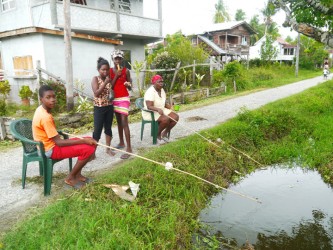
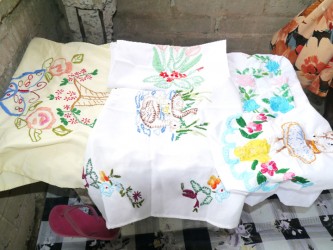
At the Anthony’s Funeral Home casket and coffin workshop, two males and a female were hard at work. They manufacture caskets in various types and patterns, ranging from $120,000 to over $200,000, with coffins starting at $30,000. These would be displayed at the funeral home located at Fort Wellington.
Across the road, an elderly couple, Jacob and Babsie Anthony were busy in their yard boiling casareep in a big pot on a fireside. Nearby, there was a huge mud oven that Babsie would use to bake bread and cake especially at Christmastime. Jacob who was feeding the fire with coconut husks to keep it lit, left to tend to his pigs that were in a pen in the yard.
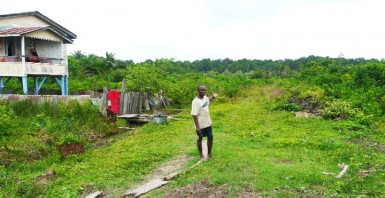
They use coconut water to make the casareep which they would put to boil with spice, cloves and pepper. This is bottled and sold for making pepperpot, cook-up rice, pot-roast chicken and other dishes. They also make oil from the coconuts which they bottle and sell. Persons use the oil to cook with while Babsie would “soak my head with it sometimes” and her husband applies it to
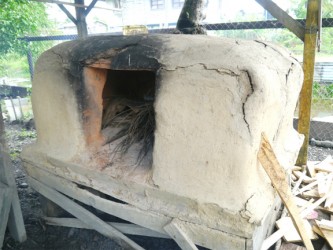
his skin. After removing the husks, they burst the nuts, extract the water, and then take them to a mill at Cotton Tree to grate. They then wash the coconut and skim off the fat and put it to boil.
The couple, who are owners of a coconut estate, supplement their income by selling icicles and ice and according to Babsie, “We can’t sit down…”
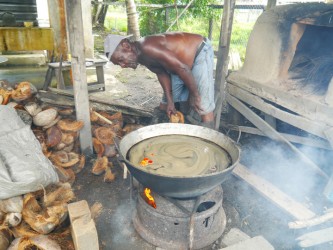
The village has five churches, a cultural centre that needs renovating, a health centre and shops. There is also has a community centre as well as a huge overhead tank and both are deemed “white elephants.”
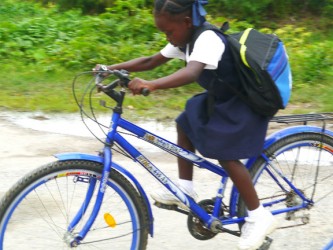
Most of the residents are employed at the Blairmont Estate while some work as nurses, teachers and security guards. Residents said some of the youths would use marijuana and would get into mischief “but you can control them.” They said too that street lights are badly needed in the village.
They were pleased that most of the streets and drains were well maintained and they were benefiting from electricity and telephone services and a potable water supply. But they lamented that the water was discoloured.
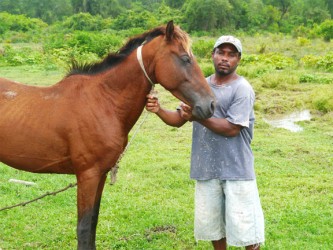
Goodridge is a security guard with Strategic Security and is attached to the Rosignol Health Centre. She is happy for a job because “there is no other work in the village and at least I know every month I have something to collect.”
Although it is risky she does not worry as “the police would pass through the area” during patrols. She said many persons in the village have qualifications but they are still finding it difficult to get jobs. they are still finding it difficult to get jobs. And as she put it, “When the young girls can’t get a job they turn to a man and dey life finish…”
Although life is a struggle for many residents, Goodridge said that “as long as you have rice and coconut and you can catch some fish, you would get food.” Goodridge’s husband, a cane-harvester would catch fish and sell to supplement his income. In fact, he had caught some hassar earlier that day and already had “market” for them.
She took this reporter to the home of her mother-in-law, 73-year-old Thelma McDonald, a councillor with the No 3/Gelderland Neighbourhood Democratic Council (NDC). The woman served in that position since 1994 when the last local government election was held.
She was concerned that a dumpsite has been identified nearby at No 4 Blairmont Squatting Area. The site “would take garbage from Bath Settlement and residents are not too happy about it being there.” According to McDonald, “It’s not in effect as yet but people would dump garbage to the end of the village.” She was “planning to raise it at an NDC meeting” later that day.
A façade trench at the back the village is not being maintained. That too “would be raised at meetings. If we really get a good rain, the whole Ithaca would flood.”
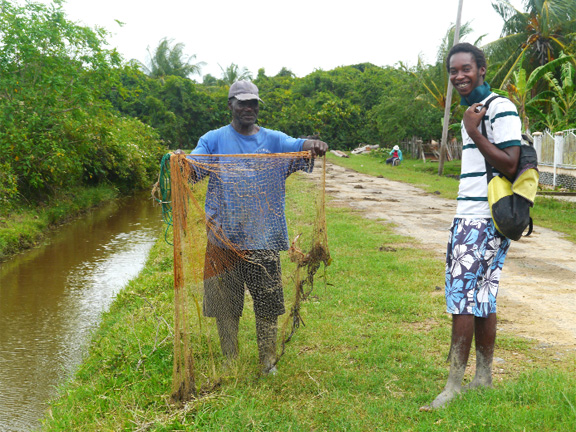
The councillor also mentioned that the NDC and the villagers had established a kiddies’ corner about six years ago. It was run by a steering committee that eventually fell apart and needs maintaining. The NDC is now responsible for it and is “waiting for the budget pass to get the funding to fix it up.”
Residents are happy that “government repaired some of the streets while Church Street would be fixed this year “as a continuation project from last year.” McDonald said the drains are being cleaned by “the D&I workers, but you know how it is; some of them doing a good job and some just do slapdash work.”
The two-flat culture centre building is currently in a deplorable condition but luckily overseas-based villagers will be renovating it. The nursery school was housed in the lower flat of the building that was presented by the late president Forbes Burnham. Activities are still held there at times though, and last weekend residents were preparing for a beauty pageant.
The senior citizens find it hard to access the upper flat because there are no rails on the concrete stairway.
The councillor recalled that last year residents held the popular May Fair in the compound. “When the renovation is completed we would make a request from donor agencies for sewing machines, computers and stoves. We want to get the youth involved and teach them a skill. The boys play football in the afternoons and the girls have to get an outlet.”
McDonald is part of a Queh-Queh group that would “go all over” to perform at cultural events and weddings when invited. “Right now only senior citizens are in the group and we are planning to get the young people involved.”
Last year the women passed on their skills to a group of students of the New Amsterdam Secondary. They students were preparing to perform the dance at an event in Georgetown.
Two years ago then Minister of Human Services, Priya Manickchand, visited the village and members of the Seventh Day Adventist church made a request for a machine and a stove which she later presented to them.
Everon Jhingoree, a cattle farmer went to check on his two horses he had tied up to graze. He uses the horses to go into the savannah, three miles away from the village, to check on his cows.
The cows are sold to butchers mostly during holidays. He returned to the village last year after spending a few years in Barbados doing construction work. His wife, Okolo is a teacher at Fort Wellington Secondary and is a student of the University of Guyana. The couple have three children.
Hannah Sinclair, 79, who is originally from Sandvoort, West Canje, lived at McKenzie before moving to Ithaca in 1984. She was also a part of the Queh Queh group. She is very skilful in hand embroidery and proudly displayed some of her work to this newspaper.
Pig and cattle farmer, Cleveland Melville was distressed that he and other residents are no longer able to do cash crop farming half a mile away in the backdam. He said a breach in the sea defence had resulted in saltwater from the Berbice River seeping into the “catchment area and affecting farmers.”
According to him, the problem has existed for more than seven years and although the government was informed nothing has been done. He said officials had “promised to look at it when they get the funds. I hope they do that as early as possible so farmers can go back on the land. “All they need to do is dig out the old koker and build a solid dam in order to keep the water out of the village. The work would not take longer than two hours,” he said. Some rice farmers plant in another section but they had to “block the entrance.”
Some persons own house lots at the back of the village and they are willing to start building their homes. They called on government to assist with electricity, water and streets so they could take in materials. A resident has already cleared his land and is waiting on the infrastructure to start building.
Ithaca was bought by eight ex-slaves in 1842 for $10,000. The main crops in those days were coffee, cocoa, citrus, coconut and ground provisions. The village was said to be the “home of music and produced good musicians.”





